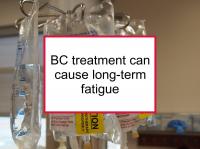Chemotherapy for breast cancer can cause fatigue that persists for years in up to one-third of survivors. The study of long-term fatigue in breast cancer survivors appears to be following a similar trajectory to the study of "chemo brain," the cognitive impairment that can also result from chemotherapy.
Researchers initially assumed that the chemo brain symptoms reported by women were primarily a consequence of depression or other emotional responses to breast cancer diagnosis and treatment. However, it has now been established that chemotherapy drugs can cause measurable brain damage in breast cancer patients and it is this damage that causes cognitive impairment.
In a similar manner, researchers are starting to uncover physiological reasons for long-term fatigue, including damage to the autonomic nervous system, leading to dysregulations of cortisol production and heart rate. Now a new study has reported that post-treatment fatigue is associated with heart rate abnormalities, rather than lack of exercise or obesity.
Fatigue in breast cancer survivors
Fatigue is a side effect of both chemotherapy and radiotherapy for breast cancer; having both increases its likelihood. Fatigue normally starts during treatment and decreases over time. Fatigue was still reported after one year by over 40% of women in one study. However, for some women who undergo chemotherapy, fatigue is a long-term problem.
Sleep disturbances are also common in patients undergoing chemotherapy and, not surprisingly, are prevalent in women who also report fatigue. Poor sleep was reported by 70% of women with fatigue at six months after treatment in one study, compared to 25% of patients without fatigue.
There appears to be a connection between cancer treatment-related fatigue and systemic inflammation, which involves the chronic activation of the immune system. Several studies have reported that chemotherapy-induced inflammation is independently associated with the development of fatigue.
Reducing fatigue
One study reported that reducing inflammation by increasing omega-3 fatty acid intake reduced cancer treatment-related fatigue. A high quality diet can also reduce fatigue, according to another study. Exercise also can reduce fatigue, but the effect typically is not dramatic.
Latest research links fatigue to heart rate disturbances
The study referenced at the beginning of this news story was designed to investigate factors associated with breast cancer treatment-related fatigue. The study included 96 breast cancer survivors who had completed treatment within in the previous six months and appeared to be disease-free.
Cancer-related fatigue was assessed with a validated questionnaire. Weekly moderate-vigorous physical activity was evaluated using accelerometers. Physical condition was also evaluated.
Study participants were recruited between March 2014 and April 2016. A total of 72% of the women had been treated with anthracyclines (doxorubicin, epirubicin), 17% with trastuzumab, and 70% with radiotherapy. The women had the following characteristics: age 52 (range: 29-78), BMI 26 (18-41), waist 86 cm (65-116), basal heart rate 74 bpm (56-102), final heart rate (after walking one mile) 107 bpm (68-159), estimated VO2max 28 ml/kg/min (8-47), strength right upper extremity 26 Kg (10-40), sit to stand test 7.4 (4.1-18.4) s. The women engaged in 231 minutes (range: 70-425) of moderate-vigorous physical activity per week. Median cancer-related fatigue PERFORM score was 46 (12-60).
No statistically significant correlations were found between fatigue and previous treatments, physical condition, body size or physical activity. However, heart rate (both basal and final) was significantly associated with fatigue. The authors comment that the study participants demonstrated poor cardiorespiratory fitness despite meeting international recommendations for physical activity.
In fact, resting and post-exercise heart rate were the only predictors of fatigue in the study population, which appears to agree with the reports of other authors, who have suggested that fatigue is associated with a maladaptive autonomic profile. Further research studying heart rate variability is warranted, according to the authors.
